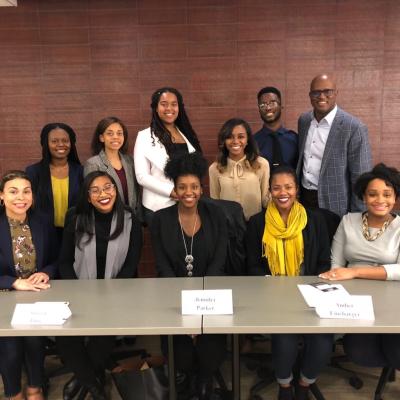Dr. Osei Appiah, professor and associate director of the School of Communication, founded the Black Advertising and Strategic Communication Association student organization in 2010 and works as the BASCA advisor and chair of the school’s Alumni Engagement Committee to create meaningful connections between students and alumni and potential employers.
Not long after coming to Ohio State in 2002, Appiah saw a pressing need for companies to partner with academic institutions to rectify the underrepresentation of Blacks at advertising, public relations and marketing firms.
BASCA aims to lead more Black students to aspire to and attain careers in advertising, PR and marketing. It provides students with access to professional networks and mentors and creates opportunities for students to gain professional experience through internships.
“BASCA’s goal is to support Black students at Ohio State with resources, networking opportunities and professional development,” said Appiah.
BASCA students participate in professional development trips to major cities leading in communication such as Chicago, New York City, Atlanta and Washington. Students meet professionals from organizations like CNN, Ketchum, Edelman, Ogilvy, The New York Times, ABC’s Good Morning America, The Chicago Tribune and LEVICK. BASCA also hosts bi-weekly student meetings on campus, welcoming executives from companies such as L Brands, JPMorgan Chase, Cardinal Health and Procter & Gamble.

“I get great joy and satisfaction helping students, especially students of color, reach their potential and fulfill their dreams,” Appiah said.
Appiah also works to position undergraduate students for success through his role as chair of the School of Communication’s Alumni Engagement Committee. The committee looks at ways to connect alumni and students through projects like the Ohio State-Michigan rivalry edition of The Lantern and an alumni mentorship pilot program for journalism students.
In addition to his leadership roles with the school, Appiah also teaches classes in advertising and strategic communication and studies the impact of race relations on social and political issues. His recent research with fellow School of Communication Professor William “Chip” Eveland focuses on how Black and white people listen to each other during political conversations, particularly those about controversial race-related issues, and their willingness to engage in cross-race conversations.
“Given the political, racial and cultural climate in the United States today, engaging in conversations about race-related topics is especially important,” said Appiah.
Their research found that Black respondents were less willing to have interracial conversations about race than white respondents. However, a person’s partisanship played a role. Specifically, Black Democrats may find the racial differences too much of a barrier to overcome and may avoid conversations about race-specific topics when interacting with whites. However, white Democrats are quite optimistic about cross-race conversations, and they are less likely than white Republicans to want to avoid interracial conversations about race-specific topics.
“Overall, we find that political conversations between whites and Blacks are still relatively rare, which makes it important to discover other ways positive race relations can develop through cross-group contact,” said Appiah.
Appiah got his professional start at Yankelevich Partners, a leading research company on public opinions, doing market research. He then went to work for Apple in Cupertino, California, in market research before moving to Nike where he worked with athletes like Deion Sanders and Ken Griffey, Jr.
Article by student Madison Fuller
